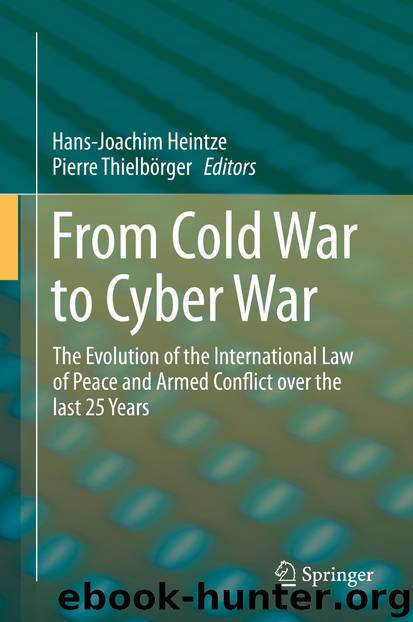From Cold War to Cyber War by Hans-Joachim Heintze & Pierre Thielbörger

Author:Hans-Joachim Heintze & Pierre Thielbörger
Language: eng
Format: epub
Publisher: Springer International Publishing, Cham
3 Potential and Areas of Research
While the tragic events of 2001 resulted in a “chilling effect” on the use of the concept by States and international organisations, research continued in several places. With regard to the EU, several reports have been produced by a London School of Economics (LSE)-led study group on operationalizing the concept, including the Barcelona-Report on a “Human Security Doctrine” for Europe and the Madrid-report on a “European Way of Security”, which defined criteria for a Human Security Approach in the Common Security and Defence Policy of the EU, including Human Rights, legitimate political authority, a bottom-up approach and clear and transparent objectives.24 At the 15th anniversary of the concept in 2009 there was talk of a second generation of human security25 mainly based on the reception within the EU. A threshold approach was suggested to better identify situations of human security. However, such approach is difficult to apply in practice. Anyway, at the 20th anniversary a revival of the concept was noted also in the United Nations.26
Several other research projects dealt with human security issues from different perspectives. For example, studies undertaken at the Institute of International Law and International Relations at the University of Graz on “Mainstreaming human security in UN peace operations and EU crises management” have shown that both in UN peace-keeping as well as in European crises management operations, the human security approach can contribute to a better operationalization of human rights and gender concerns in such missions.27 Strangely enough, the Capstone Doctrine of 2008 does not mention human security explicitly, which can be seen as demonstrating a certain ambivalence towards the concept, typical for the United Nations, but also the EU, where some member States seem to avoid using the concept. Another project dealt with the relevance of human security for the peace-building-process in the Western Balkans.28 A further research project looked at the Human Security and Human Rights Agenda with regard to the EU policy and practice in crises management operations and the European Security and Defence Policy, ranging from conflict prevention and humanitarian aid to protection of civilians, control of potential abuses and rebuilding democratic institutions.29
The advantage of a human security perspective is that it allows focusing on the interest of the human person in all decisions that are to be made, similar to the “best interest of the child”. State or national interests have to be brought in conformity with human interests and not vice-versa.30
One important aspect of human security is the relevance of human rights for the concept.31 One author has characterized their relationship as “porcupines in love”.32 Freedom from want and freedom from fear, as the two pillars of human security, can be seen as standing for economic, social and cultural as well as civil and political rights and the third pillar, the empowerment of the human person, can be associated with human rights literacy. The Institute of International Law and International Relations and the ETC Graz have been involved in the Ministerial Conference of the Human Security Network in Graz in 2003.
Download
This site does not store any files on its server. We only index and link to content provided by other sites. Please contact the content providers to delete copyright contents if any and email us, we'll remove relevant links or contents immediately.
Unwinding Anxiety by Judson Brewer(72995)
The Art of Coaching by Elena Aguilar(53194)
The Fast Metabolism Diet Cookbook by Haylie Pomroy(21131)
Rewire Your Anxious Brain by Catherine M. Pittman(18644)
Healthy Aging For Dummies by Brent Agin & Sharon Perkins RN(17038)
Talking to Strangers by Malcolm Gladwell(13349)
The Art of Thinking Clearly by Rolf Dobelli(10455)
Mindhunter: Inside the FBI's Elite Serial Crime Unit by John E. Douglas & Mark Olshaker(9324)
Crazy Rich Asians by Kevin Kwan(9279)
The Compound Effect by Darren Hardy(8949)
Tools of Titans by Timothy Ferriss(8366)
Periodization Training for Sports by Tudor Bompa(8254)
Becoming Supernatural by Dr. Joe Dispenza(8201)
Wonder by R. J. Palacio(8097)
Crystal Healing for Women by Mariah K. Lyons(7928)
Bodyweight Strength Training by Jay Cardiello(7908)
Change Your Questions, Change Your Life by Marilee Adams(7760)
Therapeutic Modalities for Musculoskeletal Injuries, 4E by Craig R. Denegar & Ethan Saliba & Susan Saliba(7713)
Nudge - Improving Decisions about Health, Wealth, and Happiness by Thaler Sunstein(7693)
